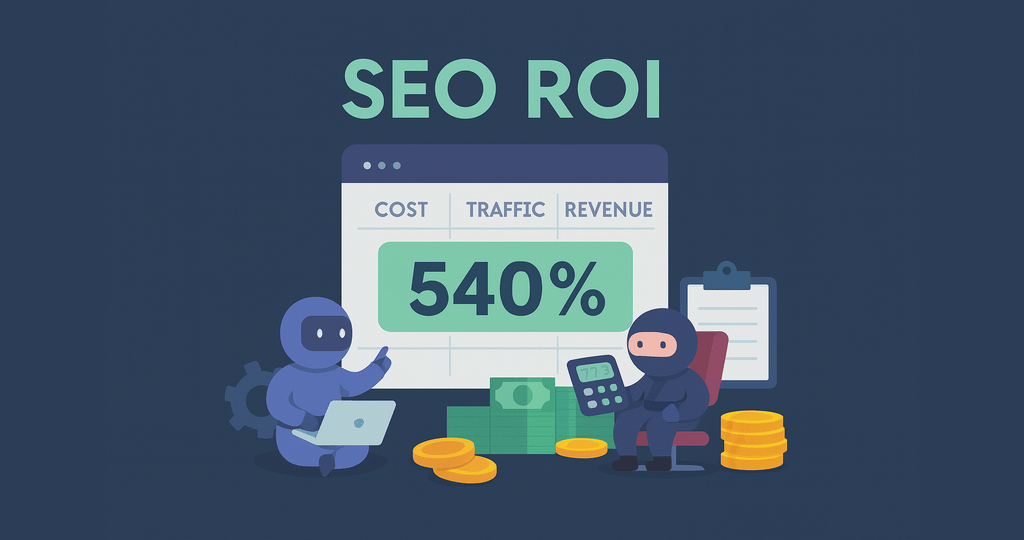What if we told you SEO ROI could be the missing piece in unlocking your digital marketing strategy’s full potential? “Maximize your online presence” gets tossed around a lot, but what does that really mean for your bottom line? As we step into the world of search engine optimization, a pressing question remains: are you actually squeezing the most value out of your SEO work? In this guide, we’ll dig into the details of SEO ROI—why it matters more than ever, and what it takes to measure and improve it for your business.
Why SEO ROI Matters
Evolving Digital Marketing Landscape
The digital marketing world has shifted dramatically in recent years, thanks to changing technologies and evolving consumer habits. One standout fact: more than 60% of global online shoppers use search engines to discover new products. This shift means businesses must rethink how they approach SEO and measure its ROI. Staying current isn’t just smart; it’s a necessity. Can you really afford to let your competitors race ahead? Some key considerations for businesses include:
- Adapting to algorithm updates
- Shifting consumer behaviors and preferences
- Emerging trends in digital marketing
Budget Constraints and Accountability
Tight budgets and the pressure to justify marketing spend keep many business leaders on their toes. SEO often stands out as a cost-conscious approach with trackable results. Marketing expert Neil Patel underscores the need for clear accountability—stakeholders want proof before greenlighting budgets. At this intersection of value and responsibility, understanding your SEO ROI becomes vital. If you found yourself with 10% more to spend, could SEO help you put that budget to better use?
Competitive Pressures Online
Online competition grows fiercer by the day, with businesses elbowing for the same slice of audience attention. A solid SEO plan can tip the scales in your favor; just look at how brands like Amazon and Google have maintained dominance. Holding your ground requires continuous effort. How will you stand out and capture a bigger share of the digital spotlight—and where does SEO fit into that plan?

Defining SEO ROI: What Counts?
Traffic Versus Revenue
When it comes to measuring your SEO success, it pays to separate traffic from revenue. Sure, a spike in visitors feels great, but revenue tells the real story. Relying on traffic numbers alone can mislead; imagine a site flooded with visitors who never buy a thing. That’s where conversion rate optimization steps in. Ever caught yourself wondering why high traffic doesn’t translate to hefty profits?
Short-Term Versus Long-Term Returns
SEO doesn’t come in just one flavor—some efforts pay off quickly, while others build value slowly over time. Experts often say: slow and steady wins the race. Investing in long-term SEO lays a solid foundation for years to come, even as you chase the occasional short-term win. Are you after a quick surge, or are you playing the long game with your SEO?
Measuring Intangible Benefits
Not every reward from SEO turns up in a sales report. Boosting brand awareness and building trust can set up your business for the long haul. Gauging these softer benefits isn’t always straightforward, but tools such as surveys and tracking online mentions can offer insight. These hidden gains often pave the way for more tangible results. How do you tally up SEO’s impact on your brand’s reputation or customer loyalty?
Suggested Readings
What is SEO ROI & How to Measure It?
Calculating SEO ROI: A Step-by-Step Guide
Common Misconceptions About SEO ROI
SEO as a Quick Fix
One myth that never seems to die: SEO can fix business woes overnight. Truth is, SEO rewards patience and persistence. Clear-eyed expectations matter for both stakeholders and practitioners. Moz says it best: “SEO is a marathon, not a sprint.” When you think about your own SEO goals, are you setting the pace for the long run?
Undervaluing Organic Traffic
Some folks still think organic traffic doesn’t pack much punch compared to paid ads. But organic visitors bring lasting value and can be easier on the budget. Ahrefs data backs this up—organic traffic often leads to higher conversions and more revenue. Does your strategy give organic traffic the attention it deserves?
Ignoring Brand and Trust Impact
SEO does more than drive clicks; it shapes how your brand is seen and trusted. One Search Engine Journal case study reveals how a brand built trust and reputation through SEO. Metrics like sentiment analysis and customer feedback shine a light on these changes. Are you making SEO part of your plan to strengthen your brand and win customer loyalty?
Traditional Metrics Vs. Real-World Results
Vanity Metrics Explained
Vanity metrics—think page views or social likes—can lead you astray. They might look impressive, but they don’t always move the business forward. Focusing on what truly matters, such as how many visitors turn into paying customers, tells a clearer story. When you check your SEO stats, are you tracking what really matters?
What Actually Drives Business Goals
If you want SEO to help the business, follow the money: customer acquisition costs, revenue growth, and similar targets should guide your efforts. Top marketers stress the importance of syncing SEO with actual business KPIs. Are your SEO efforts tied to goals that fuel your bottom line?
The Challenges of Measuring SEO ROI
Attribution Complexity
Connecting sales or leads directly to SEO isn’t always cut and dried, especially when several marketing channels interact. Attribution models can clarify the picture, but they’re not perfect—bias lurks in unexpected places. Have you struggled to tie SEO work to real-world outcomes, or found ways to bridge the gaps?

Delayed Results and Patience
SEO rewards patience; improvements don’t happen overnight. HubSpot reports it can take up to six months before serious results show up. Keeping stakeholders patient and supportive during the wait matters. What’s your strategy for keeping the faith when results take time?
Cross-Channel Influence
SEO doesn’t operate in a bubble. It impacts—and is impacted by—channels like social media, email campaigns, and pay-per-click. Evaluating SEO ROI means considering these ripple effects. In your marketing mix, how do you see SEO weaving into the bigger picture? The following table illustrates the interconnectedness of these channels:
| Channel | Description | Impact on SEO |
|---|---|---|
| Social Media | Platform for engaging with customers and sharing content | Influences brand awareness and can drive traffic to the site |
| Email Campaigns | Targeted marketing to subscribers and customers | Can increase conversions and support SEO goals |
| Pay-Per-Click | Advertising model where you pay for each ad click | Complements SEO by targeting specific keywords and audiences |
Calculate Your SEO ROI Now
Use our SEO ROI Calculator to estimate the revenue potential of your SEO campaign!
How to Accurately Track SEO ROI
Essential Tools and Software
Tracking SEO ROI calls for the right tools. SERPed.net, Google Analytics, SEMrush, and Ahrefs each bring something different to the table; features range from keyword tracking to in-depth backlink analysis. Pick what fits your needs and objectives best. Are your current tools giving you the clarity you need to steer your SEO?
Setting Up Conversion Tracking
Conversion tracking, set up through Google Analytics or a similar platform, is key for reliable SEO ROI measurement. Set clear goals—like online sales or completed forms—and ensure you’re capturing what matters. Without accurate tracking, your data won’t tell the real story. Have you dialed in your conversion tracking, or is it time for a tune-up?
Establishing Clear Benchmarks
It’s tough to measure progress without knowing where you started. Define realistic benchmarks using past data, industry standards, and your own business priorities. Don’t set them in stone—revisit and adjust as your SEO strategy evolves. When did you last update your targets for SEO, and are they still right for your business?
SEO ROI and Stakeholder Buy-In
Making the Case to Leadership
Winning stakeholder support hinges on showing SEO’s value in terms leaders care about—think revenue or profit, not just rankings. Speak their language, and back up your claims with numbers that matter to the boardroom. How do you get decision-makers to see the value of your SEO work?
Translating SEO Wins into Business Language
It’s not enough to tout technical wins; you have to connect them to business impact. Focus your story on financial gains and strategic advantages, not just rankings or traffic. A well-told story can turn dry data into an argument that resonates. How will you frame your next SEO success to make the boardroom sit up and listen?
When SEO ROI Falls Short
Diagnosing Underperformance
If your SEO ROI falls flat, don’t panic—dig into the details. Dive into your data to find bottlenecks or weak spots, then audit every angle: technical health, content quality, and your link-building approach. Sometimes, a fresh perspective uncovers issues you never expected. If things go sideways, what’s your first move to get back on track?
The Long-Term Value of SEO Investments
Building Sustainable Traffic
SEO is no one-hit wonder. Done right, it builds a stream of organic traffic that keeps delivering results over months and years. Evergreen content—pieces that remain relevant—plays a starring role in this ongoing success. Plenty of businesses have watched steady SEO work pay off with compounding growth. What’s your plan for keeping organic traffic flowing year after year?
SEO as a Compound Asset
Think of SEO as a snowball: every content update, link earned, or technical fix adds to your results over time. Early investments keep yielding more value as your site’s authority grows. How can you harness this compounding power to get the most from your SEO budget?
Case Studies: Proving SEO ROI
Small Business Success Stories
There’s no shortage of small businesses that have turned SEO into serious returns. Some focus on local search, others double down on content or polish their site’s technical details. Their stories prove that, no matter your size, the right SEO moves can pay off. Which of their lessons could you borrow for your own growth?
Enterprise-Level Transformations
Major brands have seen big gains by reworking their SEO strategies—often tying SEO into their wider marketing plans and navigating complex team dynamics. The takeaways are clear: integration and clear communication matter. Can you adapt their strategies to suit your own organization’s needs?
Frequently Asked Questions
What is SEO ROI?
SEO ROI, or Return on Investment, refers to the profit or revenue generated by SEO efforts compared to their cost.
Why is measuring SEO ROI important?
Measuring SEO ROI helps businesses understand the effectiveness of their SEO strategies and make data-driven decisions to improve them.
How do I track SEO ROI?
You can track SEO ROI using tools like Google Analytics, SEMrush, and Ahrefs, and by setting clear goals and benchmarks.
What are some common misconceptions about SEO ROI?
Common misconceptions include thinking SEO is a quick fix, undervaluing organic traffic, and ignoring brand and trust impact.
How can I improve my SEO ROI?
You can improve your SEO ROI by focusing on what truly matters, such as conversions and revenue, and by continuously monitoring and adjusting your strategy.


